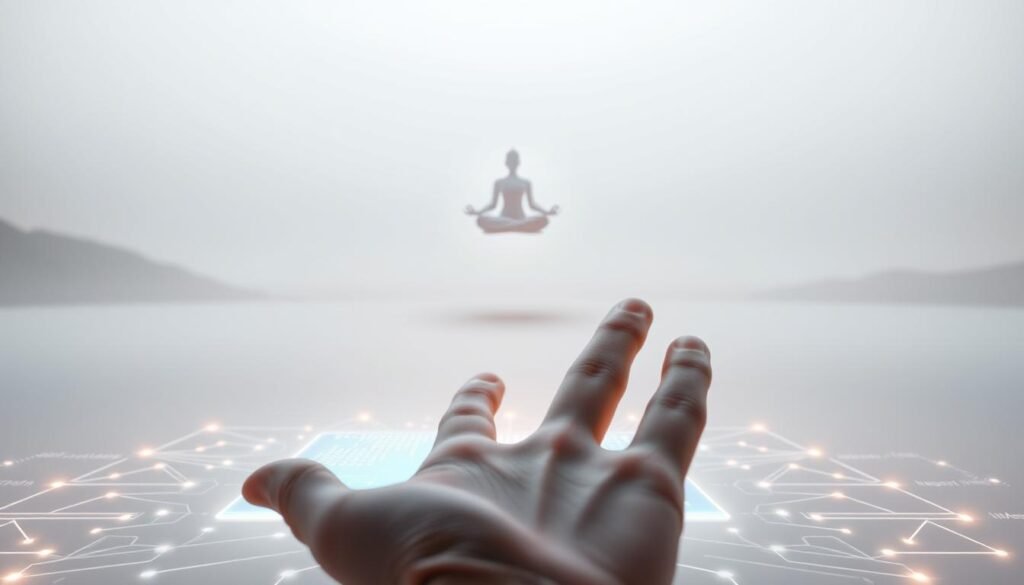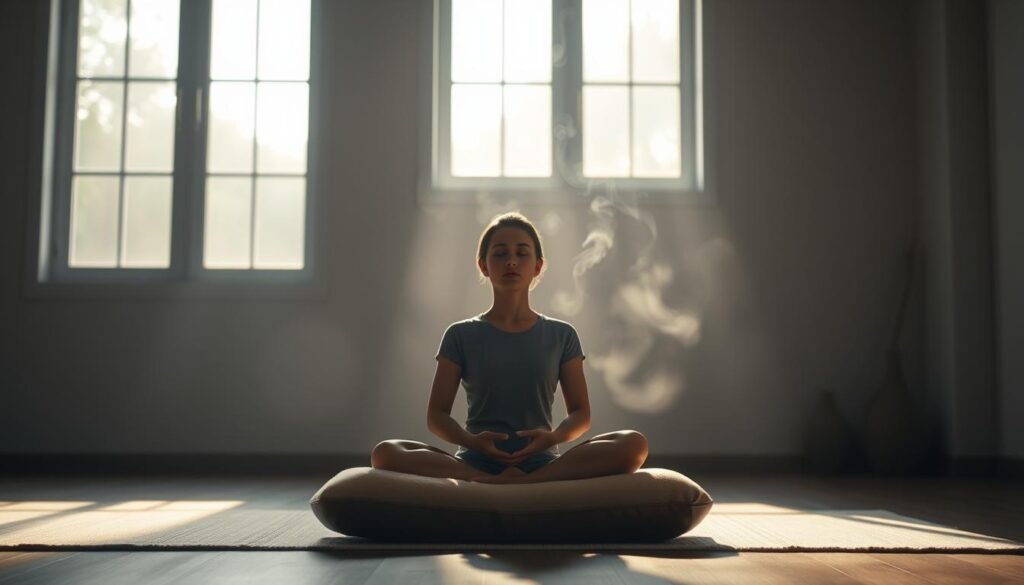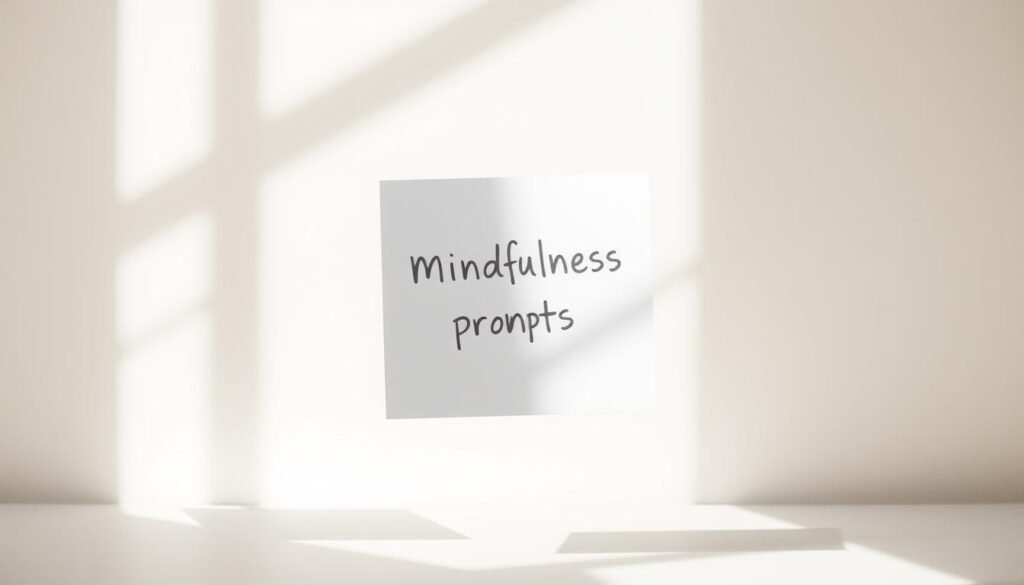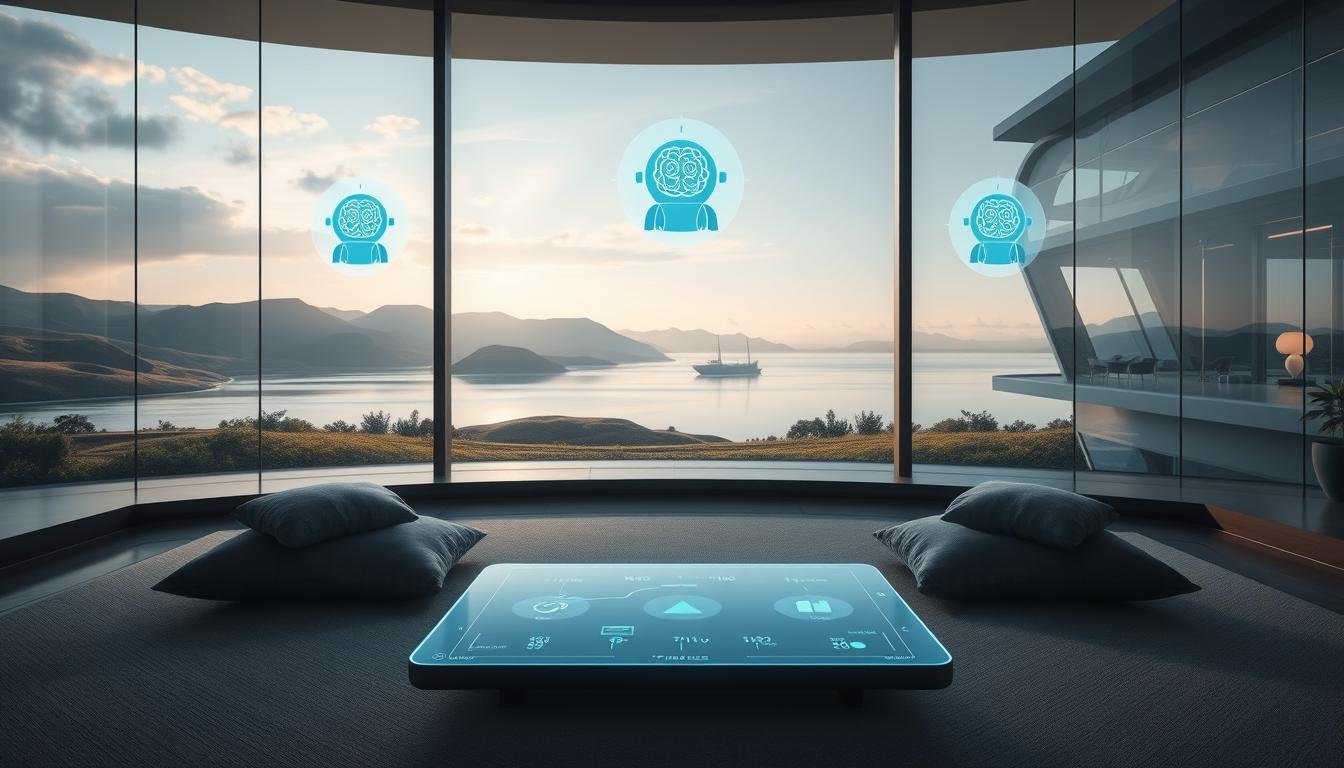How to Use ChatGPT as Your Personal Mindfulness Coach
Modern life moves fast, leaving many struggling to prioritize self-care. Between work deadlines and personal commitments, carving out time for mindfulness often feels impossible. What if support could meet you exactly where you are – anytime, anywhere?
Advanced tools now bridge the gap between ancient practices and digital convenience. Imagine having a coach that adapts to your energy levels, schedule gaps, and unique stressors. This always-available resource provides bite-sized meditation sessions during lunch breaks or calming techniques before important meetings.
Traditional approaches require rigid timetables or expensive classes. Modern solutions instead offer flexibility, delivering personalized strategies through your smartphone. Whether you’re new to breathwork or refining your practice, instant access to research-backed methods makes growth achievable.
Key Takeaways
- 24/7 availability eliminates scheduling conflicts for mental wellness support
- Customized meditation plans adapt to changing daily needs
- Quick stress-relief exercises fit into packed routines
- Progress tracking helps maintain consistent mindfulness habits
- No-cost alternative to traditional coaching services
This approach combines centuries-old wisdom with cutting-edge technology. You’ll discover how to transform idle moments into opportunities for reflection, using tools already at your fingertips. Let’s explore building resilience through smart, sustainable practices.
Introduction to ChatGPT for Mindfulness
Our buzzing devices and endless to-do lists create mental static that’s hard to escape. Nearly 80% of workers report feeling overwhelmed by daily demands, according to recent workplace surveys. This constant pressure makes finding mental clarity feel like searching for quiet in a thunderstorm.

Why Mindfulness Matters in Today’s Busy World
Stress doesn’t just affect productivity – it rewires our brains. Regular mindfulness practice helps break this cycle by teaching us to respond thoughtfully instead of reacting impulsively. Brief moments of awareness throughout the day can:
- Lower blood pressure during tense situations
- Improve focus during back-to-back meetings
- Help recharge mental energy between tasks
The Role of AI in Enhancing Well-Being
Smart technology meets self-care through tools that understand busy schedules. Unlike rigid class timetables, AI adapts to your rhythm – suggesting two-minute breathing exercises before presentations or reflective journal prompts during lunch breaks. Research shows personalized guidance increases practice consistency by 40% compared to generic apps.
This approach complements traditional methods rather than replacing them. Think of it like having a pocket-sized mentor that reminds you to pause when stress spikes or celebrates small wins in building emotional resilience.
Understanding Mindfulness and Meditation Basics
Your mind works like a muscle – it grows stronger with intentional training. While often used together, mindfulness and meditation serve distinct roles in mental fitness. One acts as your daily mental hygiene routine, while the other builds long-term resilience through structured exercise.

Fundamental Concepts of Mindfulness
Mindfulness means fully engaging with the present moment without criticism. Imagine noticing traffic noise without labeling it “annoying” – that’s non-judgmental awareness in action. This skill helps you:
- Recognize stress signals early
- Pause before reacting emotionally
- Appreciate simple daily experiences
Key Benefits of Regular Meditation
Consistent meditation practice reshapes how your brain handles challenges. Studies show just eight weeks of daily sessions can reduce anxiety triggers by 26%. Popular techniques include:
- Breathing exercises for instant calm
- Body scans to release physical tension
- Loving-kindness practices for emotional balance
Beginners often worry about “doing it right.” Remember – a wandering mind during practice isn’t failure. Each gentle refocus strengthens your attention muscles. Start with three-minute sessions and celebrate showing up, not perfection.
How to Use ChatGPT as Your Personal Mindfulness Coach
Technology and mental well-being might seem like unlikely partners, but innovative platforms bridge this gap beautifully. Imagine a resource that remembers your progress between interactions and adjusts its approach as you grow.

This digital coach begins by asking about your daily patterns and stress triggers. It then designs bite-sized exercises tailored to your schedule – whether you need a 90-second breathing session before meetings or a reflective journal prompt during lunch breaks.
Three elements make this approach stand out. First, it combines Tibetan breathing techniques with modern biofeedback research. Second, it tracks consistency without judgment, celebrating small wins. Third, it evolves with you – suggesting advanced practices once basic habits stick.
Stuck in a motivation slump? Share your challenge, and receive customized guidance like “Try the 5-4-3-2-1 grounding method during your next coffee break.” The system adapts to your energy levels, offering shorter sessions on hectic days and deeper explorations when time allows.
For those ready to expand their practice, try specific prompts like “Guide me through a body scan for better sleep.” Over time, these interactions help build resilience that spills into work relationships and creative problem-solving. Each session becomes a stepping stone toward lasting mental clarity.
Setting Up Your Personal Meditation Routine with ChatGPT
Creating lasting calm begins with intentional design, not chance. Your digital companion helps craft routines that stick by aligning with your unique lifestyle and aspirations. Start by clarifying what you want to achieve – whether it’s better sleep or sharper focus – then build habits around those priorities.
Identifying Your Mindfulness Goals
Clear intentions transform random sessions into meaningful growth. Ask yourself: “What energy do I want to cultivate?” Common goals include:
- Reducing afternoon anxiety spikes
- Enhancing creativity before work meetings
- Improving sleep quality through evening wind-downs
ChatGPT can help refine broad ideas into specific targets. Try prompts like “Help me create a stress-reduction plan for my healthcare job.”
Designing a Daily Practice
Effective routines match your natural rhythm. Track your energy peaks for a week – notice when focus comes easiest. Use these insights to schedule meditation during high-awareness windows.
| Time | Session Type | Duration | Focus Area |
|---|---|---|---|
| Morning | Breathwork | 5 min | Mental clarity |
| Midday | Body Scan | 3 min | Stress release |
| Evening | Gratitude Reflection | 7 min | Emotional balance |
Start small – three-minute sessions build consistency better than ambitious hour-long plans. Adjust durations weekly as your capacity grows. Remember: A flexible routine survives busy seasons better than rigid schedules.
Crafting Effective Prompts for Mindfulness Guidance
Clear communication unlocks an AI coach’s full potential. Like giving directions to a human mentor, your wording determines the quality of guidance received. Specific details help create responses that truly address your unique mental landscape.

Examples of Successful Meditation Prompts
Strong requests combine context with clear objectives. Compare these approaches:
| Prompt Type | Structure | Use Case |
|---|---|---|
| Basic | “Suggest a 3-minute breathing exercise” | Quick stress relief |
| Advanced | “Create a lunchtime routine for office workers managing deadlines – include body awareness and focus techniques” | Targeted skill development |
“Take on the role of an experienced coach for healthcare workers. I need evening practices to decompress after 12-hour shifts.”
Tailoring Prompts to Fit Your Needs
Personalization transforms generic advice into actionable plans. Share your energy patterns, stress triggers, and previous meditation experience. For example:
Instead of “Help me sleep better,” try:
- “Design a wind-down ritual for night shift nurses”
- “Suggest grounding techniques for new parents”
Adjust prompts based on results. If responses feel too vague, add specifics like “Ask me three questions to clarify my morning routine challenges.” This interactive approach builds truly customized guidance over time.
Integrating ChatGPT into Your Daily Mindfulness Practice
Time constraints often derail well-being efforts, but smart integration changes the game. Your digital companion works within existing routines, transforming ordinary moments into opportunities for growth. The key lies in intentional pairing – matching mindfulness practice with activities you already do.
Strategic Moments for Centering
Identify natural pauses in your day for bite-sized sessions. Try these integrations:
- Morning coffee ritual → 2-minute intention setting
- Commute time → Audio-guided breathwork
- Pre-meeting preparation → Grounding visualization
Stuck in a long queue? Use that waiting time for a sensory awareness exercise. Prompt example:
“Guide me through a 3-minute observation practice using my current environment.”
Consistency matters more than duration. Schedule five micro-practice slots:
| Time | Activity | Focus |
|---|---|---|
| 7:15 AM | Breakfast prep | Mindful tasting |
| 1:30 PM | Post-lunch walk | Body awareness |
| 5:45 PM | Commute home | Stress release |
Travel or sick days? Adapt with prompts like “Suggest seated stretches with breath focus.” Your mindfulness daily rhythm becomes weatherproof through flexible planning.
Utilizing ChatGPT for Stress Management Techniques
Daily pressures can quietly erode our sense of calm, making stress management essential for sustained productivity. Modern tools provide real-time support, offering strategies that fit seamlessly into packed schedules.
Finding Balance During Busy Days
Short, targeted techniques prevent overwhelm during crunch times. Try a one-minute breathing session before work calls or a sensory check-in while waiting for coffee. These micro-practices help reset your nervous system without disrupting workflow.
Effective approaches include:
- Mindfulness reminders during transition periods (post-meeting, pre-commute)
- Customized grounding exercises for high-stress work scenarios
- Evening reflection prompts to process daily challenges
Adaptable techniques meet you where you are. Stuck in traffic? Request a focus-boosting audio guide. Facing tight deadlines? Use quick body scans to maintain clarity. Consistency builds resilience – even three-minute daily sessions create lasting change.
By blending ancient wisdom with modern tech, these tools make mindfulness accessible during life’s chaotic moments. The result? Improved emotional balance that supports both personal well-being and professional performance.
FAQ
Can ChatGPT help me start a mindfulness practice if I’m a beginner?
Absolutely! Tools like ChatGPT offer guided steps for newcomers. Share your goals, schedule, or challenges, and it will suggest simple exercises like breathing techniques or short meditation prompts to build consistency.
How do I create effective prompts for mindfulness sessions?
Focus on clarity and purpose. For example, ask for “a 5-minute body scan script” or “a prompt to reduce stress before work.” ChatGPT can adapt responses to your preferences, such as time limits or specific mental health goals.
Can I track my progress with ChatGPT?
While it doesn’t store data, you can journal insights after each session. Ask for reflective questions like, “What emotions came up today?” or request weekly check-ins to review your mindfulness journey without judgment.
How does AI personalize mindfulness guidance?
Share details like your daily routine, stressors, or preferred meditation techniques. ChatGPT uses this info to suggest tailored exercises, such as stress management scripts during busy days or gratitude practices.
What if I only have 10 minutes a day for mindfulness?
Short sessions work! Ask for prompts like “guided breathing for focus” or “quick body relaxation.” Tools like ChatGPT can break practices into bite-sized steps, making it easier to stay consistent with daily habits.
Can ChatGPT replace a human mindfulness coach?
It’s a supplement, not a replacement. Use it for instant guidance and resources, but pair it with expert-led programs or apps like Headspace for deeper mental health support. Always consult professionals for serious concerns.
How do I stay motivated with daily practice?
Set clear intentions, like “reduce anxiety” or “improve focus.” ChatGPT can generate reminders, affirmations, or adapt routines to keep your mindfulness practice fresh and aligned with evolving goals.
Share this content:




Post Comment